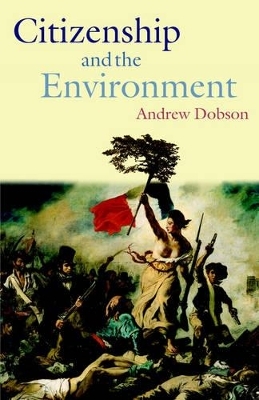
Citizenship and the Environment
Seiten
2003
Oxford University Press (Verlag)
978-0-19-925843-7 (ISBN)
Oxford University Press (Verlag)
978-0-19-925843-7 (ISBN)
The UK's leading Green Political Theorist presents the first book-length treatment of the relationship between citizenship and the environment. He offers an innovative, international, intergenerational, and justice-based conception of citizenship which will change the way we think about the environment and our responsibilities to it.
This is the first book-length treatment of the relationship between citizenship and the environment. Andrew Dobson argues that ecological citizenship cannot be fully articulated in terms of the two great traditions of citizenship - liberal and civic republican - which have been bequeathed to us. He develops an original theory of citizenship, which he calls 'post-cosmopolitan', and argues that ecological citizenship is an example and an inflection of it. Ecological citizenship focuses on duties as well as rights, and these duties are owed, non-reciprocally, by those individuals and communities who occupy unsustainable amounts of ecological space, to those who occupy too little. The first virtue of ecological citizenship is justice, but post-cosmopolitanism follows some feminisms in arguing that care and compassion may be required to meet its special obligations. Dobson suggests that ecological citizenship's conception of political space is not the state or the municipality, or the ideal speech community of cosmopolitanism, but the 'ecological footprint'.
Most governments around the world have signed up to sustainable development, and they cannot afford to ignore ecological citizenship as a means of getting there. Government policies usually revolve around financial sticks and carrots, but these leave people uncommitted to the idea of sustainability and only to the rewards that are attached to it. Dobson contrasts citizenship with fiscal incentives as a way of encouraging people to act more sustainably, in the belief that the former is more compatible with the long-term and deeper shifts of attitude and behaviour that sustainability requires. Both citizenship and sustainability, though, are often viewed with suspicion in liberal societies because they refuse to accept the inviolability of individual preferences. Dobson therefore offers an original account of the relationship between liberalism and sustainability, arguing that the former's commitment to a plurality of conceptions of the good entails a commitment to so-called 'strong' forms of the latter.
How to make an ecological citizen? Dobson examines the potential of formal high school citizenship education programmes through a case study of the recent implementation of the compulsory citizenship curriculum in the UK. He concludes that the Department of Education and Skills has constructed a Trojan horse capable of kick-starting ecological citizenship, if teachers are willing and able to travel in it.
This book will be of interest to those working in the fields of environmental political theory, citizenship, globalisation, cosmopolitanism, liberalism, and citizenship education.
This is the first book-length treatment of the relationship between citizenship and the environment. Andrew Dobson argues that ecological citizenship cannot be fully articulated in terms of the two great traditions of citizenship - liberal and civic republican - which have been bequeathed to us. He develops an original theory of citizenship, which he calls 'post-cosmopolitan', and argues that ecological citizenship is an example and an inflection of it. Ecological citizenship focuses on duties as well as rights, and these duties are owed, non-reciprocally, by those individuals and communities who occupy unsustainable amounts of ecological space, to those who occupy too little. The first virtue of ecological citizenship is justice, but post-cosmopolitanism follows some feminisms in arguing that care and compassion may be required to meet its special obligations. Dobson suggests that ecological citizenship's conception of political space is not the state or the municipality, or the ideal speech community of cosmopolitanism, but the 'ecological footprint'.
Most governments around the world have signed up to sustainable development, and they cannot afford to ignore ecological citizenship as a means of getting there. Government policies usually revolve around financial sticks and carrots, but these leave people uncommitted to the idea of sustainability and only to the rewards that are attached to it. Dobson contrasts citizenship with fiscal incentives as a way of encouraging people to act more sustainably, in the belief that the former is more compatible with the long-term and deeper shifts of attitude and behaviour that sustainability requires. Both citizenship and sustainability, though, are often viewed with suspicion in liberal societies because they refuse to accept the inviolability of individual preferences. Dobson therefore offers an original account of the relationship between liberalism and sustainability, arguing that the former's commitment to a plurality of conceptions of the good entails a commitment to so-called 'strong' forms of the latter.
How to make an ecological citizen? Dobson examines the potential of formal high school citizenship education programmes through a case study of the recent implementation of the compulsory citizenship curriculum in the UK. He concludes that the Department of Education and Skills has constructed a Trojan horse capable of kick-starting ecological citizenship, if teachers are willing and able to travel in it.
This book will be of interest to those working in the fields of environmental political theory, citizenship, globalisation, cosmopolitanism, liberalism, and citizenship education.
Acknowledgements ; Introduction ; 1. Towards Post-Cosmopolitanism ; 2. Three Types of Citizenship ; 3. Ecological Citizenship ; 4. Environmental Sustainability in Liberal Societies ; 5. Citizenship, Education, and the Environment ; Conclusion
| Erscheint lt. Verlag | 18.12.2003 |
|---|---|
| Verlagsort | Oxford |
| Sprache | englisch |
| Maße | 144 x 223 mm |
| Gewicht | 441 g |
| Themenwelt | Naturwissenschaften ► Biologie ► Ökologie / Naturschutz |
| Sozialwissenschaften ► Politik / Verwaltung ► Politische Systeme | |
| Sozialwissenschaften ► Politik / Verwaltung ► Politische Theorie | |
| ISBN-10 | 0-19-925843-0 / 0199258430 |
| ISBN-13 | 978-0-19-925843-7 / 9780199258437 |
| Zustand | Neuware |
| Haben Sie eine Frage zum Produkt? |
Mehr entdecken
aus dem Bereich
aus dem Bereich


